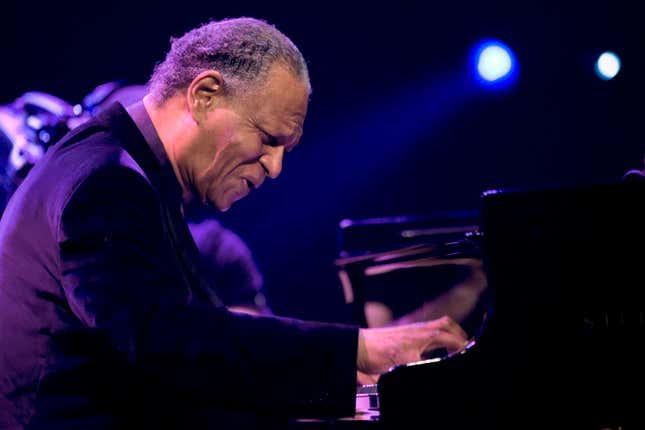
Another one of the greatest who ever did it has gone on to glory.
Legendary jazz pianist McCoy Tyner is dead at age 81.
The death of the free-flowing jazz giant, who played piano alongside John Coltrane, Donald Byrd and Art Blakey, was announced by family members via social media on Friday.
“It is with heavy hearts that we announce the passing of jazz legend, Alfred “McCoy” Tyner. McCoy was an inspired musician who devoted his life to his art, his family and his spirituality,” the statement read. “McCoy Tyner’s music and legacy will continue to inspire fans and future talent for generations to come.”
No further details were provided.
Born Alfred McCoy Tyner in Philadelphia on Dec. 11, 1938 — right before the beginning of World War II — he started getting paid gigs by age 16 and at the age of 21, he met Coltrane and joined him for the seminal 1961 album My Favorite Things, a major success that highlighted the unmatched chemistry of the John Coltrane Quartet – which also included Jimmy Garrison and Elvin Jones.
The album, which featured renditions of Cole Porter’s “Ev’ry Time We Say Goodbye” and Ira and George Gershwins’ classic “Summertime,” was inducted into the Grammy Hall of Fame in 1998.
The quartet would go on to release more revered projects, becoming an international renowned group and one of the seminal acts in jazz history.
Tyner’s instrumentation quickly became integral to the Coltrane’s sound and is central to other Coltrane recordings, most notably Ascension and 1965’s A Love Supreme.
“We functioned like one person,” the left-handed Tyner said in a 2001 interview for the Jerry Jazz Musician non-commercial website on recording A Love Supreme. “It wasn’t like we were four guys on stage doing his own particular kind of thing. In other words, it had to be in relationship to the total. To me, it’s a wonderful way to not only think, but behave. I think to create civility in life and society itself, to think of yourself in relationship to other people. What you do, may [affect] someone else. We have to be conscious of that, that we don’t function by ourselves. When you get in a situation where everyone is thinking democratically, thinking in terms of what is played and how it [affects you] and how your response to it effects those around you.”
The five-time Grammy Award winner was the last of the group’s original surviving members.
On his own as a bandleader, Tyner himself recorded more than 30 albums, including Expansions, Asante and 1972’s beloved Sahara.
A frequent performer at New York City’s legendary Blue Note nightclub, the revered musician owned one of the most recognizable keyboard sounds in jazz and favored acoustic instrumentation and never used electric pianos or synthesizers for his performances.
Tyner recorded with a who’s who of jazz music luminaries, recording with George Benson, Elvin Jones, Bobby Hutcherson, Stanley Clarke and Christian McBride.
On Twitter, the six-time Grammy winning bassist, composer and paid his respects, referring to him as “The pride of West Philadelphia [and] a giant among giants.”
In 2002, he was honored by the National Endowment for the Arts as jazz master and was awarded an honorary doctorate from the Berklee College of Music in 2005.
According to The New York Times, Tyner is survived by his wife, Aisha Tyner; his son, Nurudeen; his brother, Jarvis; his sister, Gwendolyn-Yvette Tyner; and three grandchildren.

